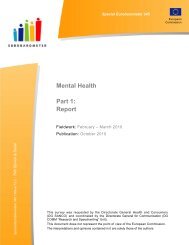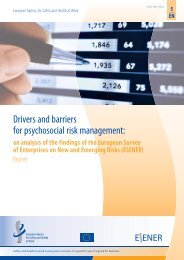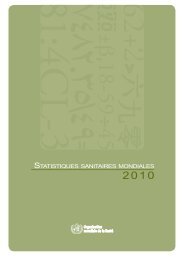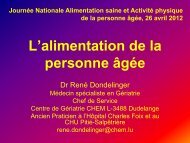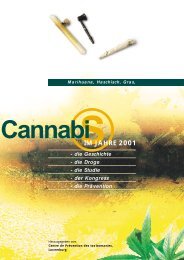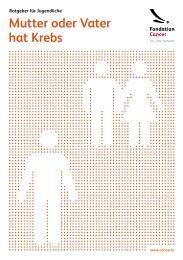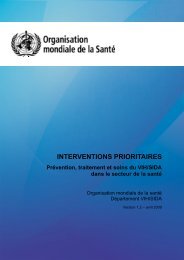healthy and active ageing - EuroHealthNet's Healthy Ageing Website
healthy and active ageing - EuroHealthNet's Healthy Ageing Website
healthy and active ageing - EuroHealthNet's Healthy Ageing Website
You also want an ePaper? Increase the reach of your titles
YUMPU automatically turns print PDFs into web optimized ePapers that Google loves.
1. what is understood by ‘<strong>healthy</strong> <strong>ageing</strong>’<br />
Increasing life expectancy has led to higher expectations amongst people in the EU not only to live longer,<br />
but to live longer with lower levels of morbidity <strong>and</strong> fewer years of disability, <strong>and</strong> with a high quality of life.<br />
Medical advances are increasingly making longer <strong>healthy</strong> life-spans possible, while escalating health <strong>and</strong><br />
social costs mean that there is a stronger interest amongst older people <strong>and</strong> society as a whole to promote<br />
health in old age. The WHO writes that investing in health throughout life produces dividends for societies<br />
everywhere. 1<br />
As mortality rates between countries in the EU <strong>and</strong> also amongst different groups within the EU countries<br />
varies considerably, the age at which an individual is considered <strong>and</strong> considers him/herself ‘older’ also<br />
varies. According to Mark Gorman at HelpAge International, the <strong>ageing</strong> process is of course a biological<br />
reality which has its own dynamic, largely beyond human control. However, it is also subject to the<br />
constructions by which each society makes sense of old age. In the developed world, chronological time<br />
plays a paramount role. The age of 60 or 65, roughly equivalent to retirement ages in most developed<br />
countries, is said to be the beginning of old age. 2 Many WHO documents often define ‘older people’ as<br />
those over 60 years of age. 3<br />
This report looks at policies, programmes <strong>and</strong> interventions to improve or sustain health of the ‘youngerold’,<br />
defined as 55-60+. While many people in the EU of this age would not define themselves as ‘old’,<br />
it is important to focus on this ‘younger’ age group in order to take preventative measures to stave off<br />
health-related problems in the next decades, as the share of people aged 65 years or over in the total EU<br />
population is projected to rise from 85 million in 2008 to 151 million in 2060. 4 People aged 80 years or over<br />
are projected to almost triple from 22 million in 2008 to 61 million in 2060. 4 It should be noted that to really<br />
address <strong>healthy</strong> <strong>ageing</strong>, preventive measures should start at early childhood <strong>and</strong> be adopted throughout<br />
the life course. 5<br />
While sustaining health calls for interventions that address physical health, such as good nutrition, adequate<br />
levels of physical activity <strong>and</strong> good healthcare, it is certainly not limited to this. According to the World Health<br />
Organisation’s classic definition (1947), health is not merely ‘the absence of infirmity or disease’, but ‘a state<br />
of complete physical, mental <strong>and</strong> social well- being’. That this belief is widely held, <strong>and</strong> that health is a means<br />
to successful <strong>ageing</strong>, <strong>and</strong> not an end in itself is reflected in the responses to a survey that was conducted<br />
in the UK, asking people aged 50+ what they felt were the main constituents of successful <strong>ageing</strong>. 6 While<br />
health <strong>and</strong> functioning were the most common responses, these were rarely given on their own. Many<br />
other factors such as ‘well-being’ <strong>and</strong> ‘mental psychological health’ are also linked to successful <strong>ageing</strong>.<br />
1 http://www.who.int/features/factfiles/<strong>ageing</strong>/<strong>ageing</strong>_facts/en/index4.html<br />
2 Gorman M. Development <strong>and</strong> the rights of older people. In: R<strong>and</strong>el J, et al., eds. The <strong>ageing</strong> <strong>and</strong> development report:<br />
poverty, independence <strong>and</strong> the world’s older people. London, Earthscan Publications Ltd.,1999:3-21.<br />
3 http://www.who.int/healthinfo/survey/<strong>ageing</strong>defnolder/en/index.html<br />
4 The ratio of the number of elderly persons of an age when they are generally economically in<strong>active</strong> (usually aged 65 <strong>and</strong><br />
over) to the number of persons of working age (usually from 15 to 64). European Commission, EUROSTAT<br />
5 http://www.health-gradient.eu/<br />
6 Sarkisian CA, Hays RD, Mangione CM. Do older adults expect to age successfully? The associations between expectations<br />
regarding aging <strong>and</strong> beliefs regarding healthcare among older adults. J Am Geriat Soc 2002;50:1837-43<br />
7



